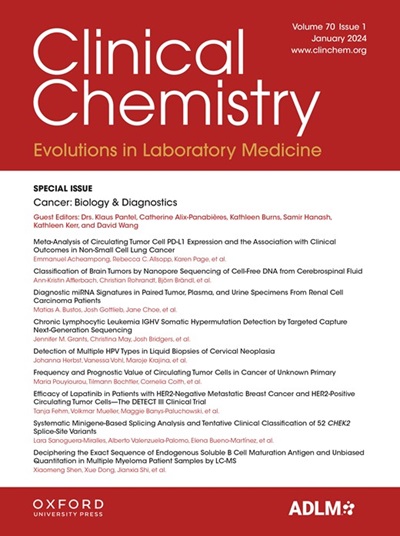A-351 用于改进床旁诊断的多功能灵敏微流控免疫分析仪
IF 7.1
2区 医学
Q1 MEDICAL LABORATORY TECHNOLOGY
引用次数: 0
摘要
背景 医疗保健专业人员必须在诊断灵敏度和易用性之间做出选择,尤其是在诊断 COVID-19 和链球菌性咽喉炎等疾病时。传统的酶联免疫吸附测定法(ELISA)灵敏度高,但需要大量人力和时间。侧流检测法(LFA)是一种成本低、使用方便、结果快速的替代方法,但 LFA 的灵敏度较低。Burst Diagnostics 公司推出的毛细管驱动免疫测定(CaDI)是一种开创性的解决方案,它是一种新型微流控装置,灵敏度可与 ELISA 相媲美,但操作却比 LFA 简单。方法 CaDI 由分层透明胶片和含有 HRP 结合物和发光酚试剂垫的胶片组成流道。该系统只需用户添加一个样品步骤。样品流启动夹心酶联免疫吸附试验的连续步骤,由设备全自动完成,根据样品基质的不同,可在 10 分钟或更短时间内提供化学发光信号。结果 我们在检测 SARS-CoV-2 核头壳蛋白 (NP) 和 A 组链球菌 (GAS) 的初步研究中取得了成功。通过使用抗 NP 抗体组装和优化 COVID-19 CaDI,实现了对 NP 的检测。然后,对添加了 10 到 1000 PFU/mL 的鼻拭子样本进行了检测,阳性检出率低至 10 PFU/mL,远低于传统 LFA 中的相同样本(见图)。此外,我们还证明了在优化的缓冲液条件下成功检测出的 GAS 比常用的 LFA 低 100 倍。最后,多路复用 CaDI 提高了医疗点的通量和成本效益。结论 CaDI 平台兼具 LFA 的简便性和实验室检测的灵敏度/特异性。目前,CaDI 可以检测 SARS-CoV-2 NP 和 GAS,灵敏度高于现有的 LFA。与 CaDI 配套的阅读器正在开发中,将进一步简化检测。重要的是,由于该平台的灵敏度、简便性和适应性,潜在的检测目标是巨大的。本文章由计算机程序翻译,如有差异,请以英文原文为准。
A-351 Versatile and Sensitive Microfluidic Immunoassay for Improved Point-of-Care Diagnostics
Background Healthcare professionals must choose between sensitivity and ease-of-use in diagnostics, particularly for diseases like COVID-19 and strep throat. Traditional enzyme-linked immunosorbent assays (ELISAs) are sensitive but are manually intensive and lengthy. Lateral flow assays (LFAs) are an alternative with low cost, ease-of-use, and rapid results; but LFAs suffer from low sensitivity. Burst Diagnostics presents a groundbreaking solution with the capillary-driven immunoassay (CaDI), a novel microfluidic device delivering sensitivity comparable to ELISA with the ease of LFAs. Methods The CaDI is made of flow channels defined by layered transparency and adhesive sheets containing reagent pads with HRP-conjugated antibody and luminol. The system requires only a sample addition step by the user. Sample flow initiates sequential steps of a sandwich ELISA, fully automated by the device, to provide a chemiluminescent signal in 10 minutes or less, depending on sample matrix. Results We have demonstrated success with preliminary studies for the detection of SARS-CoV-2 nucleocapsid protein (NP) and group A streptococcus (GAS). Detection of NP was achieved by assembling and optimizing COVID-19 CaDI’s using anti-NP antibodies. Then, spiked nasal swab samples were tested ranging from 10 to 1000 PFU/mL with positive detection as low as 10 PFU/mL, much less than the same samples in a traditional LFA (see figure). Additionally, we have demonstrated successful detection of GAS in optimized buffer conditions up to 100-fold less than commonly used LFAs. Finally, multiplexed CaDI’s increase throughput and cost-effectiveness in the point-of-care setting. Conclusions The CaDI platform bridges the ease of LFAs and sensitivity/specificity of laboratory tests. Currently, the CaDI can detect SARS-CoV-2 NP and GAS with higher sensitivity than existing LFAs. Development is underway for a reader to accompany the CaDI and further simplify the test. Importantly, the potential targets for detection are immense due to the sensitivity, simplicity, and adaptability of the platform.
求助全文
通过发布文献求助,成功后即可免费获取论文全文。
去求助
来源期刊

Clinical chemistry
医学-医学实验技术
CiteScore
11.30
自引率
4.30%
发文量
212
审稿时长
1.7 months
期刊介绍:
Clinical Chemistry is a peer-reviewed scientific journal that is the premier publication for the science and practice of clinical laboratory medicine. It was established in 1955 and is associated with the Association for Diagnostics & Laboratory Medicine (ADLM).
The journal focuses on laboratory diagnosis and management of patients, and has expanded to include other clinical laboratory disciplines such as genomics, hematology, microbiology, and toxicology. It also publishes articles relevant to clinical specialties including cardiology, endocrinology, gastroenterology, genetics, immunology, infectious diseases, maternal-fetal medicine, neurology, nutrition, oncology, and pediatrics.
In addition to original research, editorials, and reviews, Clinical Chemistry features recurring sections such as clinical case studies, perspectives, podcasts, and Q&A articles. It has the highest impact factor among journals of clinical chemistry, laboratory medicine, pathology, analytical chemistry, transfusion medicine, and clinical microbiology.
The journal is indexed in databases such as MEDLINE and Web of Science.
 求助内容:
求助内容: 应助结果提醒方式:
应助结果提醒方式:


